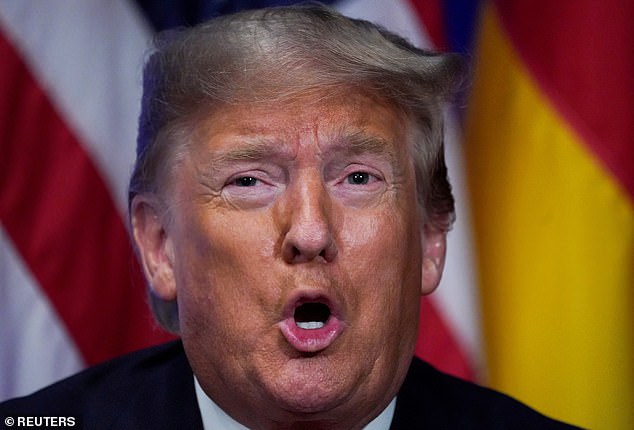In an unprecedented moment in U.S. history, President-elect Donald Trump faced sentencing on Friday in the Stormy Daniels hush money case in New York.
The sentence was handed down in an austere Manhattan courtroom by Judge Juan M. Merchan, a New York state judge, who oversaw Trump’s trial last year.
At the end of the trial in May, Trump was found guilty of 34 felony counts of falsifying business records.
The seriousness of the charges meant it was open to the judge to impose a jail sentence.
However, under New York state law, they were ‘E’ level felony charges – the lowest level of felony – meaning a jail sentence was not mandatory.
A fine or probation were also sentences the judge could have imposed for such charges.
But, instead, Judge Merchan gave Trump a ‘no-penalty’ sentence called an unconditional discharge.
An unconditional discharge means no jail time, no probation, and no fines for Trump, but it will go on his permanent record.
Judge Merchan initially revealed his thinking in a dramatic court filing last week, when he said it was the ‘most viable solution to ensure finality’ in the case before Trump takes office.
Other defendants who have received the same sentence include some convicted of speeding, or not having proper license plates.
It means Trump will be a convicted felon.
Ten days after his sentencing he will become the first person convicted of a felony to assume the U.S. presidency.

Donald Trump is receiving an ‘unconditional discharge’ meaning no jail, fine, or probation

Judge Juan Merchan decided not to send Trump to jail
Prosecutors did not oppose the judge over the unconditional discharge.
The lenient sentence is a rarity in felony convictions such as Trump’s.
The judge has said he handed it down partly to avoid complicated constitutional issues that would arise if he imposed a penalty that overlapped with Trump’s upcoming presidency.
Under New York state law an unconditional discharge is described as a sentence ‘without imprisonment, fine or probation supervision.’
It is an option when a judge is of ‘the opinion that no proper purpose would be served by imposing any condition upon the defendant’s release.’

Donald Trump reacts as the verdict is read in his criminal trial over charges that he falsified business records to conceal money paid to silence porn star Stormy Daniels in 2016, at Manhattan state court in New York City, U.S. May 30, 2024

onald Trump attends his criminal trial over charges that he falsified business records to conceal money paid to silence porn star Stormy Daniels
Other New York cases in which unconditional discharges have been used previously include marijuana offenses, and defendants not paying taxes.
It has also been used in cases where defendants have been convicted of trespassing, or refused to take a sobriety test when caught driving under the influence.
A lawyer received an unconditional discharge after being convicted of submitting false payment vouchers, and another lawyer was given that sentence for a charge of official misconduct.
Since his conviction in May, Trump’s lawyers had fought tooth and nail in a bid to get the case dismissed, or his sentencing postponed
They made various arguments to Judge Merchan, New York appeals judges, and federal courts including the U.S. Supreme Court.

Donald Trump denies claims by Stormy Daniels (R)

Trump supporters congregate at Collect Pond Park across from Manhattan Criminal Court waiting for a verdict in the the former Presidents Hush money trial on May 30, 2024 in New York City
Trump’s lawyers repeatedly argued that he was covered by presidential immunity from prosecution.
In July, they got a boost with a Supreme Court decision that affords former commanders-in-chief considerable immunity.
After Trump won the election November his lawyers argued the case had to be scrapped to avoid impinging on his transition to the Oval Office and his second term.
Judge Merchan, a Democrat, repeatedly postponed the sentencing, which had initially been set for July.

Donald Trump sits in the courtroom as the jury is scheduled to continue deliberations in his criminal trial at New York State Supreme Court in New York, New York, USA, 30 May 2024

Donald Trump, far left, watches as jury foreperson #1 delivers guilty verdicts with judge Juan Merchan listening on the bench in Manhattan Criminal Court, Thursday, May 30, 2024
But last week, he set Friday, January 10 as the sentencing date.
He wrote that he was striving to balance Trump’s need to govern, the Supreme Court’s immunity ruling, the respect due a jury verdict and the public’s expectation that ‘no one is above the law.’
Trump’s lawyers then launched a flurry of last-minute efforts to block the sentencing.
Their last hope vanished on Thursday night with a 5-4 Supreme Court ruling that declined to delay the sentencing.
This article was originally published by a www.dailymail.co.uk . Read the Original article here. .

